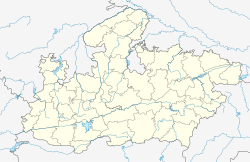Karera Wildlife Sanctuary is a wildlife Sanctuary in the Shivpuri district of Madhya Pradesh, India. Established in 1981 to protect a population of the Great Indian bustard in the region, it is now in the process of being denotified due to opposition by the local people and the extinction of the bird locally. The tour guide Frommer's included it as 231st in a list of 500 places to see before they disappear.[2]
| Karera Wildlife Sanctuary | |
|---|---|
| Location | Shivpuri, Madhya Pradesh, India |
| Coordinates | 25°27′25″N 78°07′41″E / 25.457°N 78.128°E |
| Area | 202 square kilometres (78 sq mi) |
| Created | 1981[1] |
History edit
The Karera Sanctuary was notified in 1981 by the Government of Madhya Pradesh in accordance with the provisions of the Wild Life (Protection) Act, 1972.[1] It is spread over an area of 202 km2, of which as much as 146 km2 is privately owned land. It was originally created with the aim of protecting the local population of the great Indian bustard.[3] Owing to public pressure and the extinction of the bird locally, the National Board for Wildlife and the Government of Madhya Pradesh have decided to denotify the sanctuary. The decision is now awaiting a final approval from the Supreme Court of India and should it come through, the sanctuary will become the country's first such reserve to lose its official recognition.[1][4]
Flora edit
The sanctuary contains mixed deciduous forests and acacia is the principal species. It also has riverine and swamp vegetation within its borders.[5]
Fauna edit
The bustard, locally known as son chidiya or the golden bird and the blackbuck are the two important faunal species at the park, although bustards have not been spotted here since 1994.[4] The Dihaliya lake within the park hosts migratory birds and the initial approval for denotification of the sanctuary required the establishment of a sanctuary consisting of the lake and the government land around it. 245 migrant species of avifauna including pintails, terns, spoonbills and teals have been recorded at Karera.[3][6]
References edit
- ^ a b c "Wildlife Sanctuary". Press Information Bureau, Government of India. Retrieved 30 May 2013.
- ^ Hughes, Holly (2009). Frommer's 500 Places to See Before They Disappear. Hoboken, New Jersey: Wiley Publishing. p. 231. ISBN 9780470431627.
- ^ a b "Karera sanctuary set to close as 'golden bird' visits no more". Zee News. April 22, 2010. Retrieved 30 May 2013.
- ^ a b "Concern over plans to downgrade Indian national park". BBC. 22 June 2010. Retrieved 30 May 2013.
- ^ Negi, Sharad (2002). Handbook of National Parks, Wildlife Sanctuaries and Biosphere Reserves in India. New Delhi: Indus Publishing Company. pp. 129–130. ISBN 8173871280.
- ^ "Karera Wildlife Sanctuary". The Hindu. May 28, 2007. Archived from the original on October 29, 2013. Retrieved 30 May 2013.
